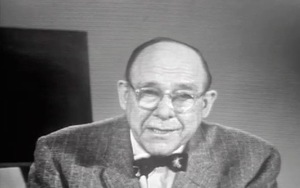Psychology One; Is Man Free To Choose?
Item Information
- Title:
- Psychology One; Is Man Free To Choose?
- Description:
-
The topics of this episode are determinism and man's freedom. Science and religion are discussed. Dr. Boring mentions that the Soviet Union followed the philosophy of dialectic materialism, which determined its economic plan. This did not work for all, and voluntarism was implemented instead. He mentioned a book on contribution of catholic church into scientific psychology Roman Catholic Psychology, which shows no conflict between observation and revelation. Necessity of freedom is discussed. Dr. Boring points out that Freud came into scene with the dynamic personality, but novelists discovered that deterministic personality does not always work for novels and fictional characters, because literature needs freedom. He brings up the history of science and how things happened at particular times, because they fitted with culture and thought at the time. Hence simultaneous scientific discoveries could happen, i.e. the discovery of planet Neptune. Dr. Boring shows the chart of black dots representing events and discoveries and explains that models don't have to be truthful to be useful. He talks about tolerance and how people need to understand rather than blame. According to Dr. Boring, freedom means responsibility. He offers an ethical model: keep responsibility for yourself and try to lift it from another and try to understand his/her causes. If you both fail, then you are both in determinism. Dr. Boring concludes the last episode with the words of hope that the Psychology One program will give his audience the attitude of tolerance to understand other human beings rather than blaming them. Summary and select metadata for this record was submitted by The Boston Psychoanalytic Society and Institute. This series (of 38 programs) presents Dr. Edwin Boring's famous psychology course which he teaches at Harvard. He gives the basic facts and principles necessary to uncover man's awareness, thought and behavior. Stress will be placed on the biological development of these phenomena and the role of heredity and learning in determining human abilities and human efficiency.
- Narrator:
- Pierce, William W., III
- Engineer:
- Richardson, Arthur
- Engineer:
- Harvey, Frank
- Creator:
- Rice, Roger W.
- Creator:
- Pray, Leonard C.
- Creator:
- Messenger, Lawrence J.
- Producer:
- Sisson, Thomas K.
- Sound designer:
- Busiek, William S.
- Creator:
- Prodan, Peter
- Creator:
- Lovell, Edgar
- Host:
- Boring, Edwin G.
- Creator:
- Hollander, Lilly
- Creator:
- Gardner, Elizabeth
- Director:
- Davis, David M.
- Creator:
- Stevens, Joseph C.
- Date:
-
July 2, 1957
- Format:
-
Audio recordings (nonmusical)
- Location:
- American Archive of Public Broadcasting
- Collection (local):
-
American Archive of Public Broadcasting Collection
- Series:
- American Archive of Public Broadcasting > Psychology One
- Subjects:
-
Philosophy of Dialectic Materialism
Voluntarism
Roman Catholic Psychology
Boring, Edwin G.
History of Science
Harvard University
Psychology
Religion
Science
Dynamic Personality
- Link to Item:
- https://americanarchive.org/catalog/cpb-aacip-15-1r6n00zq38
- Terms of Use:
-
Rights status not evaluated.
Contact host institution for more information.
- Publisher:
-
Courtesy of Thirteen/WNET New York and WGBH Boston



